【January 16th@Centennial Clock Tower Memorial Hall】L-INSIGHT Career Program Human and Diversity of Individuals Based on Data Studied by Early Career Researchers
3rd Life as a Scholar ‘Your home and beyond’
Program
Opening remarks
TOKITOH Norihiro [Executive Vice-President for Research and Evaluation, Kyoto University]
Part 1 | 13:10−15:30
Symposium ‘Human and Diversity of Individuals Based on Data Studied by Early Career Researchers’
ISHIKAWA Fuyuki [Program Manager, Program for the Development of Next-generation Leading Scientists with Global Insight (L-INSIGHT) / Director, Kyoto University Research Administration Center (KURA) / Vice-President for Academic Research Support, Kyoto University]
“Social Impact of Research and Inner Circle”
TAKAHASHI Yusuke [Graduate School of Education, Kyoto University / L-INSIGHT Fellow]
“Do Educational Psychology and Behavioral Genetics Have Social Impact?”
TAKAGI Yu [Perceptual and Cognitive Neuroscience Laboratory, Graduate School of Frontier Biosciences, Osaka University / Center for Information and Neural Networks (CiNet), National Institute of Information and Communications Technology (NICT)]
“Combining Neuroscience and Artificial Intelligence to Understand How Brain Activity Shapes Us and Our Lives”
David Budtz Pedersen [Human Centred Science and Digital Technology, Department of Communication and Psychology, Aalborg University]
“Science Communication for Effective Societal and Policy Impact”
ASATANI Kimitaka [Department of Technology Management for Innovation, Graduate School of Engineering, University of Tokyo]
“Observation of International Time-Lag in Research Topics via Large-Scale Bibliographic Analysis”
Part 2 | 15:40−16:45
Networking & Refreshments
Toast
HIRAJIMA Takao [Director, Kyoto University Division of Graduate Studies ]
*Click on image to download PDF
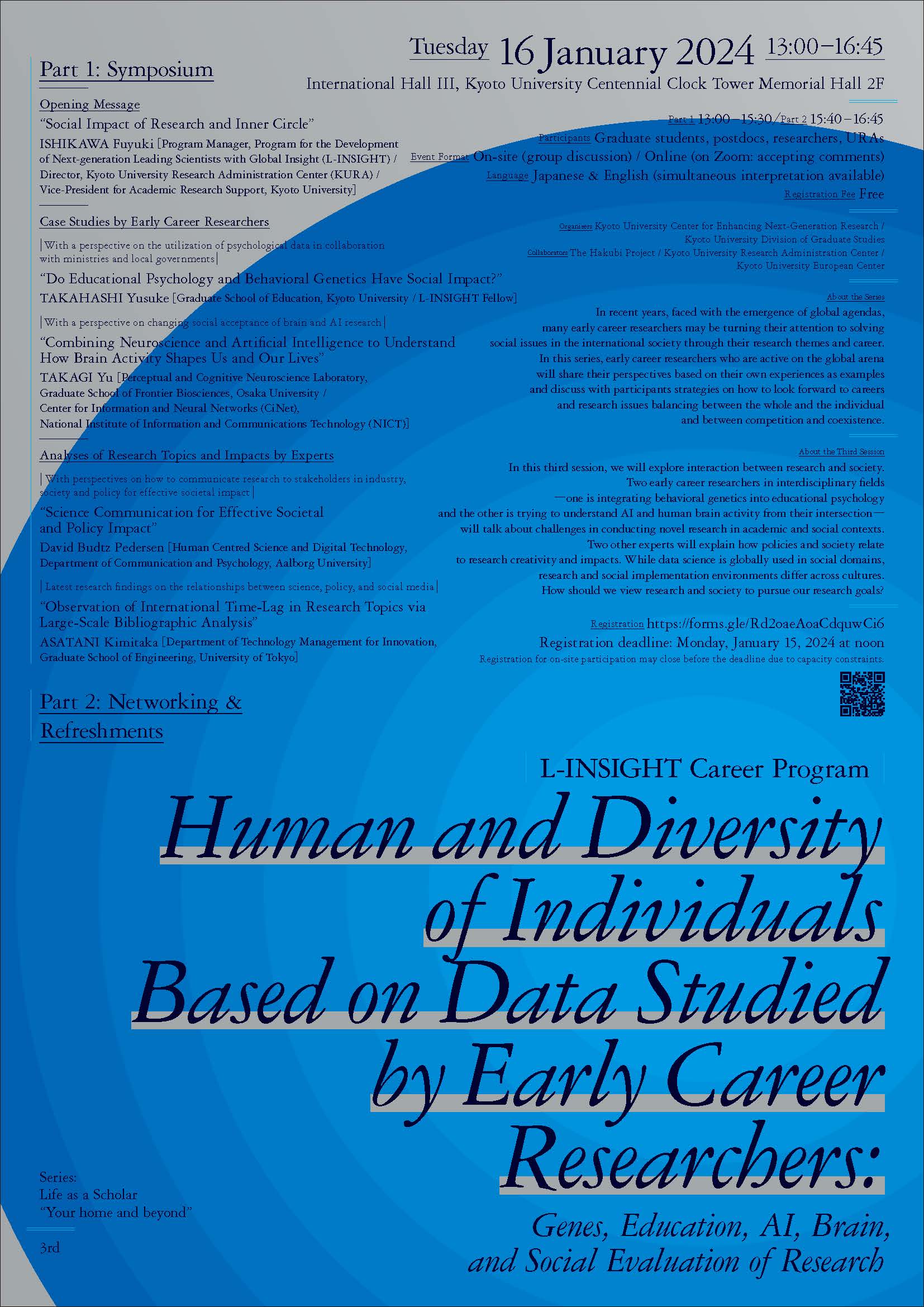
Registration
Registration Required
https://forms.gle/Rd2oaeAoaCdquwCi6
Registration deadline: Monday, January 15, 2024 at noon
Registration for on-site participation may close before the deadline due to capacity constraints.
Introduction
In recent years, faced with the emergence of global agendas, many early career researchers may be turning their attention to solving social issues in the international society through their research themes and career. In this series, early career researchers who are active on the global arena will share their perspectives based on their own experiences as examples and discuss with participants strategies on how to look forward to careers and research issues balancing between the whole and the individual and between competition and coexistence.
In this third session, we will explore interaction between research and society. Two early career researchers in interdisciplinary fields—one is integrating behavioral genetics into educational psychology and the other is trying to understand AI and human brain activity from their intersection—will talk about challenges in conducting novel research in academic and social contexts. Two other experts will explain how policies and society relate to research creativity and impacts. While data science is globally used in social domains, research and social implementation environments differ across cultures. How should we view research and society to pursue our research goals?
Information
| Date and Time | Tuesday, January 16, 2024 Part 1: 13:00−15:30|Part 2: 15:40−16:45 |
| Venue | International Hall III, Kyoto University Centennial Clock Tower Memorial Hall 2F |
| Participants | Graduate students, postdocs, researchers, URAs |
| Event Format | On-site (group discussion) / Online (on Zoom; accepting comments) |
| Language | Japanese & English (simultaneous interpretation available) |
| Registration Fee | Free |
| Registration | Registration Required https://forms.gle/Rd2oaeAoaCdquwCi6 Registration deadline: Monday, January 15, 2024 at noon Registration for on-site participation may close before the deadline due to capacity constraints. |
Timetable
〈Opening remarks〉 13:00−13:05
TOKITOH Norihiro [Executive Vice-President for Research and Evaluation, Kyoto University]
〈Part 1〉Symposium|13:10−15:30
Human and Diversity of Individuals Based on Data Studied by Early Career Researchers: Genes, Education, AI, Brain, and Social Evaluation of Research
Opening Message|13:10−13:15
ISHIKAWA Fuyuki [Program Manager, Program for the Development of Next-generation Leading Scientists with Global Insight (L-INSIGHT) / Director, Kyoto University Research Administration Center (KURA) / Vice-President for Academic Research Support, Kyoto University]
“Social Impact of Research and Inner Circle”
Case Studies by Early Career Researchers|13:15−13:45
TAKAHASHI Yusuke [Graduate School of Education, Kyoto University / L-INSIGHT Fellow]
“Do Educational Psychology and Behavioral Genetics Have Social Impact?”
With a perspective on the utilization of psychological data in collaboration with ministries and local governments
TAKAGI Yu [Perceptual and Cognitive Neuroscience Laboratory, Graduate School of Frontier Biosciences, Osaka University / Center for Information and Neural Networks (CiNet), National Institute of Information and Communications Technology (NICT)]
“Combining Neuroscience and Artificial Intelligence to Understand How Brain Activity Shapes Us and Our Lives”
With a perspective on changing social acceptance of brain and AI research
Analyses of Research Topics and Impacts by Experts|13:45−14:15
David Budtz Pedersen [Human Centred Science and Digital Technology, Department of Communication and Psychology, Aalborg University]
“Science Communication for Effective Societal and Policy Impact”
With perspectives on how to communicate research to stakeholders in industry, society and policy for effective societal impact
ASATANI Kimitaka [Department of Technology Management for Innovation, Graduate School of Engineering, University of Tokyo]
“Observation of International Time-Lag in Research Topics via Large-Scale Bibliographic Analysis”
Latest research findings on the relationships between science, policy, and social media
Group Discussion with Speakers|14:15−14:45
◆Group Facilitators
KIM Suhyun [Graduate School of Letters, Kyoto University]
HATA Miyuki [Graduate School of Agriculture, Kyoto University]
SASAGAWA Sohei [Graduate School of Biostudies, Kyoto University]
CHANG KuoCh’ing [Graduate School of Informatics, Kyoto University]
Ana Belén Barrera Aguirre [Center for the Evolutionary Origins of Human Behavior, Kyoto University]
Samuel Matthew Girao Dumlao [Graduate School of Energy Science, Kyoto University]
Plenary Discussion|14:45−15:30
◆Moderator
SUZUKI Yuta [Japan Science and Technology Agency (JST) / Institute for Integrated Cell-Material Sciences (iCeMS), Kyoto University]
〈Part 2〉Networking & Refreshments|15:40−16:45
Enjoy free refreshments from Maeda Coffee!
Toast
HIRAJIMA Takao [Director, Kyoto University Division of Graduate Studies / Vice-President, Kyoto University]
Profiles
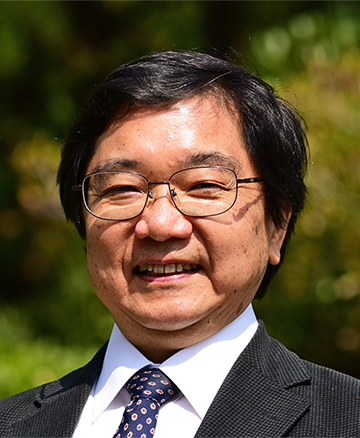
ISHIKAWA Fuyuki
Program Manager, Program for the Development of Next-generation Leading Scientists with Global Insight (L-INSIGHT) / Director, Kyoto University Research Administration Center (KURA) / Vice-President for Academic Research Support, Kyoto University
M.D., Ph.D. in Medicine, The University of Tokyo. After serving as Research Associate at Carcinogenesis Division, National Cancer Center Research Institute, Research Assistant at The University of Tokyo Hospital, Post-doctoral Fellow at Thomas R. Cech Laboratory, University of Colorado at Boulder, Associate Professor and later Professor at Department of Life Science, Tokyo Institute of Technology, Professor at Graduate School of Biostudies, Kyoto University, took the current posts.
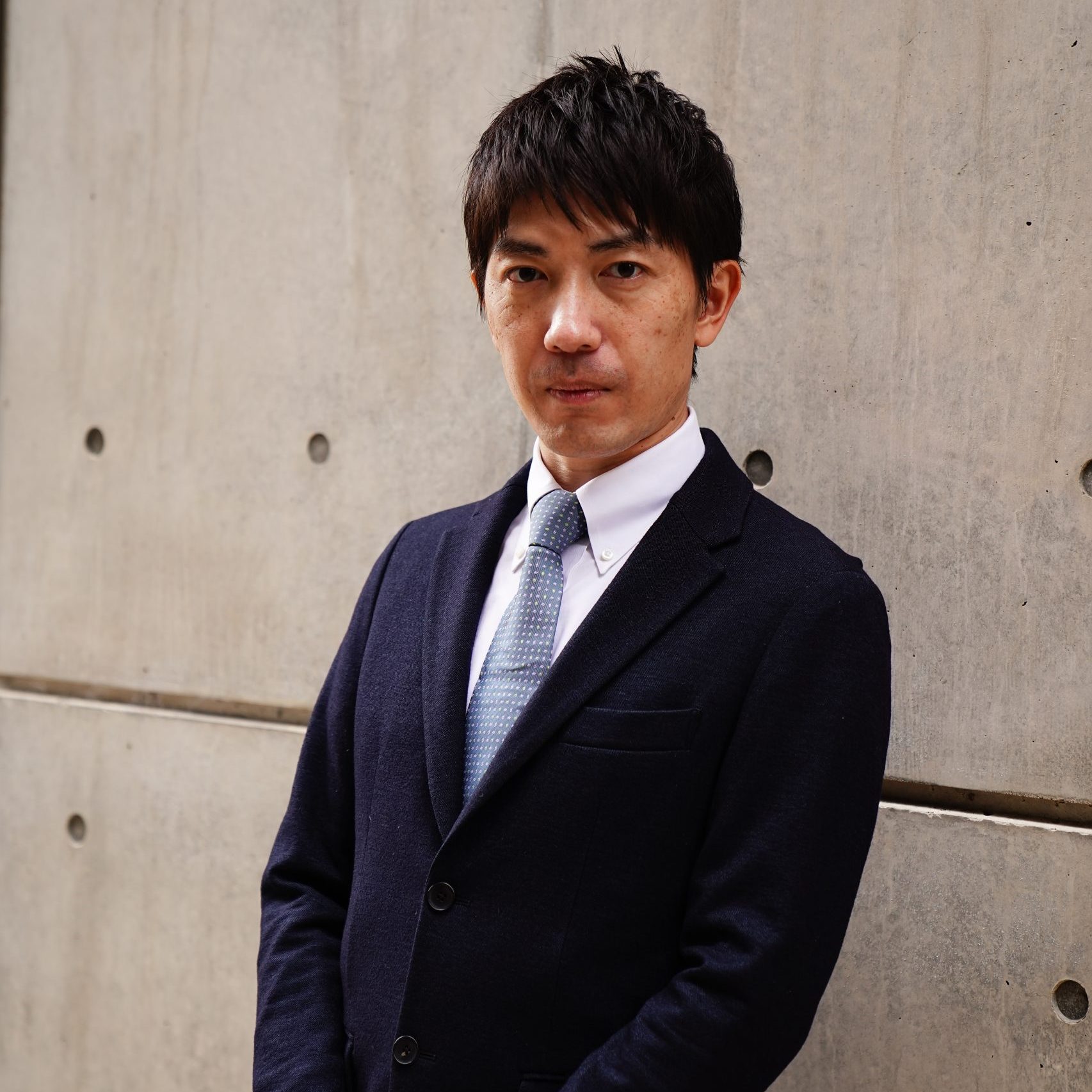
TAKAHASHI Yusuke
Associate Professor, Graduate School of Education, Kyoto University / Associate Professor, Institute for Liberal Arts and Sciences, Kyoto University / L-INSIGHT Fellow
Ph.D. (Department of Multi-Disciplinary Sciences, Graduate School of Arts and Sciences, The University of Tokyo). After fixed-term posts at Kyoto University (Center for the Promotion of Excellence in Higher Education, Collaborative Graduate Program in Design, and The Hakubi Center for Advanced Research), joined my current position in April 2020. Specializes in educational psychology, development psychology, and behavioral genetics. Engages in research that elucidates developmental aspects and underlying mechanisms of individual differences in human psychological characteristics and psychiatric symptoms, as well as that seeks a deeper understanding of the complex interactions between genes and environments therein.
https://www.l-insight.kyoto-u.ac.jp/en/fellows/takahashi/
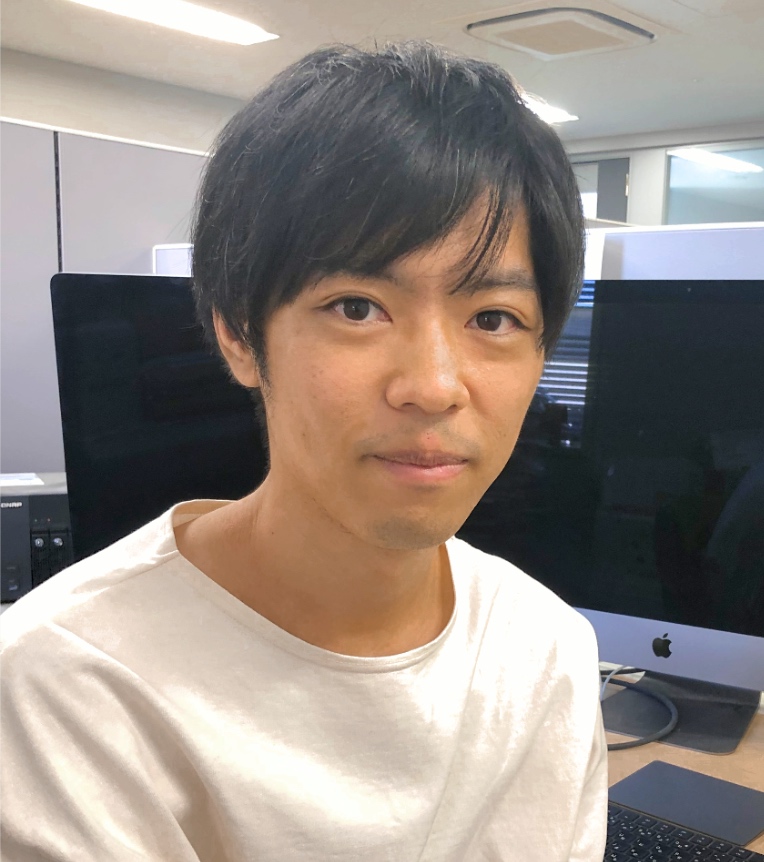
TAKAGI Yu
Assistant Professor, Perceptual and Cognitive Neuroscience Laboratory, Graduate School of Frontier Biosciences, Osaka University / Visiting Researcher, Center for Information and Neural Networks (CiNet), National Institute of Information and Communications Technology (NICT)
2018 Ph.D., Graduate School of Information Science, Nara Institute of Science and Technology. 2018–2020 Visiting Researcher at the University of Oxford and Specially Appointed Researcher at the University of Tokyo Hospital. 2020–2021 JSPS Overseas Research Fellow at Stanford University and Specially Appointed Researcher at Graduate School of Humanities and Sociology, The University of Tokyo. 2021 current post. Engaged in interdisciplinary research integrating system neuroscience and machine learning.
Keywords of specialized field: systems neuroscience, artificial intelligence.
https://yu-takagi.github.io/

David Budtz Pedersen
Professor, Human Centred Science and Digital Technology, Department of Communication and Psychology, Aalborg University / Head, the Humanomics Research Centre at Aalborg University Copenhagen
David Budtz Pedersen’s research focuses on science communication, evidence-informed policy-making, and the impact of Humanities and Social Sciences. He frequently acts as speaker and policy adviser to international governments and funding agencies. Dr. Pedersen has about 150 entries on his list of publications ranging from research papers, research monographs, edited volumes, policy reports, op-ed columns and newspaper articles. He is the Chair of the EU COST CCA Expert Group on Science Communication. In 2020, he was appointed Science Adviser on ‘Algorithms, Data and Democracy’ by the Villum & Velux Foundations.
https://www.sci-com.eu/main/index.php/dr-professor-david-budtz-pedersen
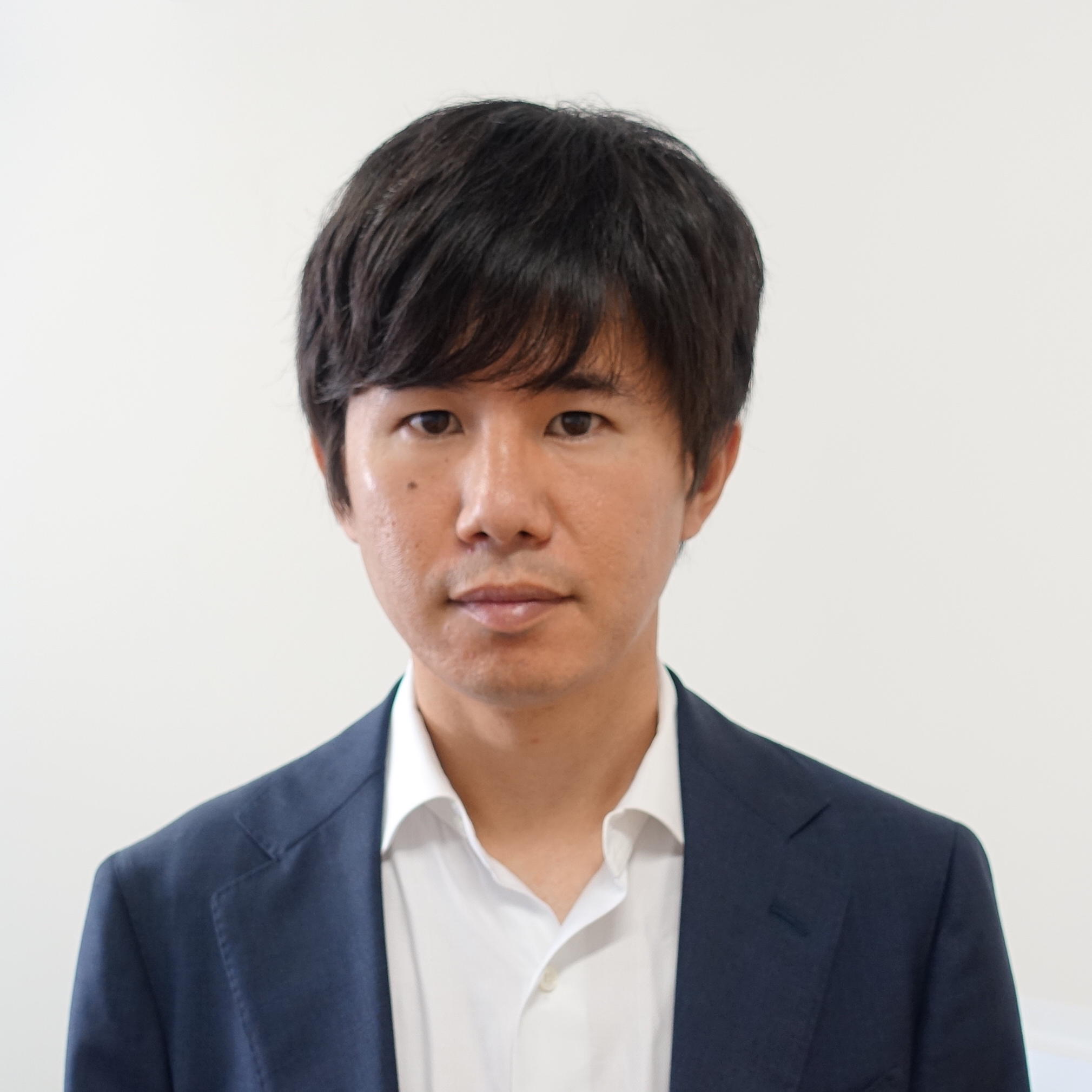
ASATANI Kimitaka
Specially Appointed Lecture, Department of Technology Management for Innovation, Graduate School of Engineering, University of Tokyo
Kimitaka Asatani received his Ph.D. in Engineering from the University of Tokyo, focusing on social simulation. Now engaged in computational social science, their primary interest lies in the “Science of Science,” exploring innovation processes using academic bibliographic data. They investigate how researchers choose topics, study topic progress across countries, and the interplay between policy, science, and social media. Additionally, he analyzes urban mobility data, using IC card movements from the Kansai region to infer friendships and examining urban behaviors influenced by regional and economic differences.
Keywords of specialized field: science of science, complex network.
https://www.sakatalab.t.u-tokyo.ac.jp/about-5
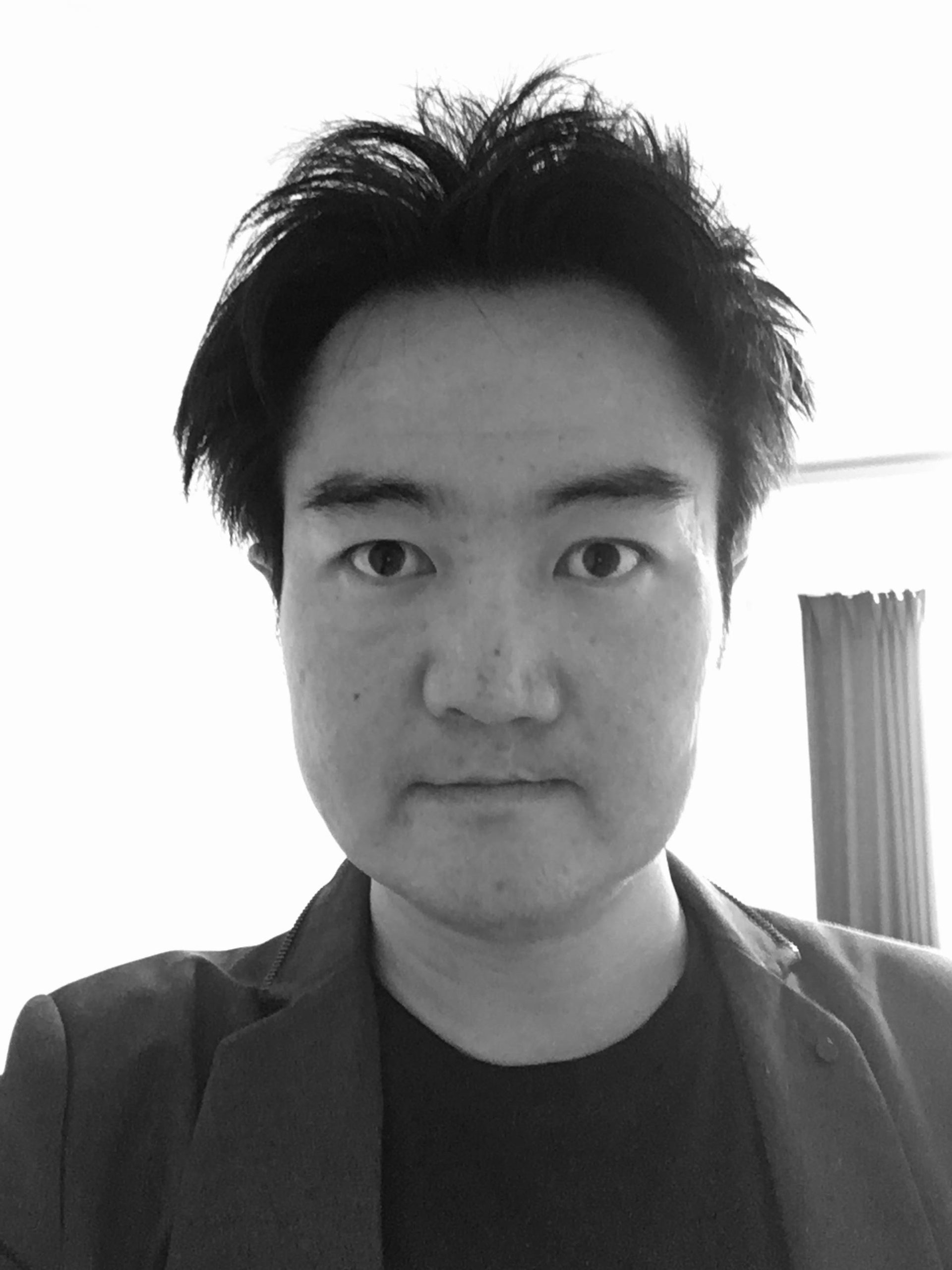
SUZUKI Yuta
PRESTO Researcher, Japan Science and Technology Agency (JST) / Program-Specific Assistant Professor, Institute for Integrated Cell-Material Sciences (iCeMS), Kyoto University
Ph.D. in Chemistry, the University of Michigan, Ann Arbor. After serving as a postdoctoral fellow in the Tezcan lab (UCSD), where he was engaged in research on protein design and engineering, an employee at a start-up company in Japan, a Program-Specific Assistant Professor at The Hakubi Center for Advanced Research, Kyoto University, assumed his current positions. His research aims to establish a modular protein assembly design that can precisely arrange proteins to create assemblies of various shapes and to construct functional protein assemblies. In addition, he has been working on the creation of novel protein designs as a leader of the “SPEED” project, JSPS Grant-in-Aid for Transformative Research Areas (B), since 2021.
https://www.jst.go.jp/kisoken/presto/en/project/1112094/1112094_2022.html
https://www.yutasuzukilab.com/en/
https://sites.google.com/view/proteinengineering-speed/home?authuser=0
Group Facilitators
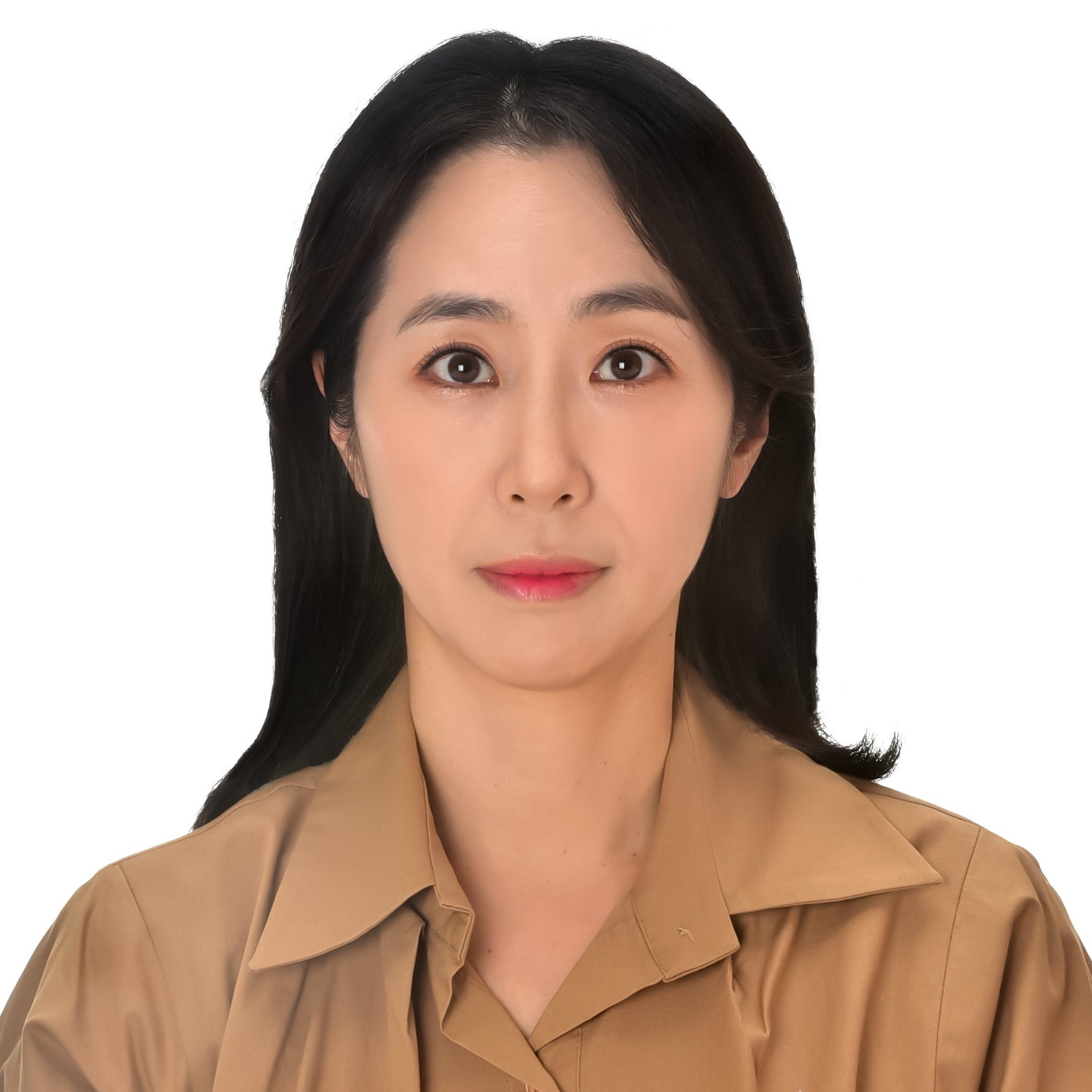
KIM Suhyun
[Graduate School of Letters, Kyoto University]
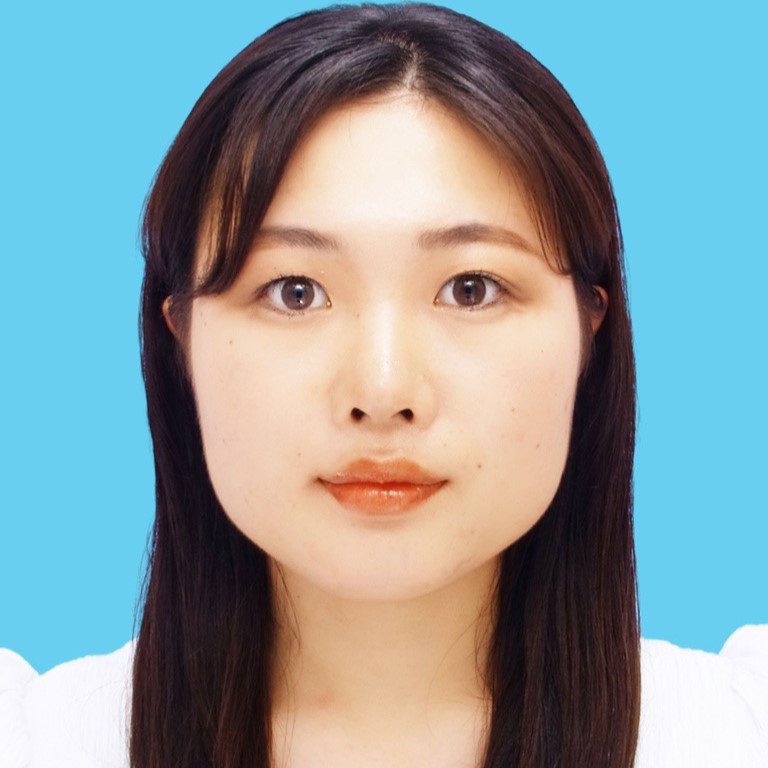
HATA Miyuki
[Graduate School of Agriculture, Kyoto University]
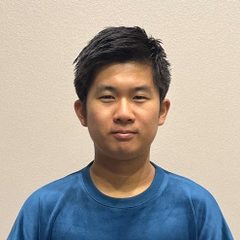
SASAGAWA Sohei
[Graduate School of Biostudies, Kyoto University]
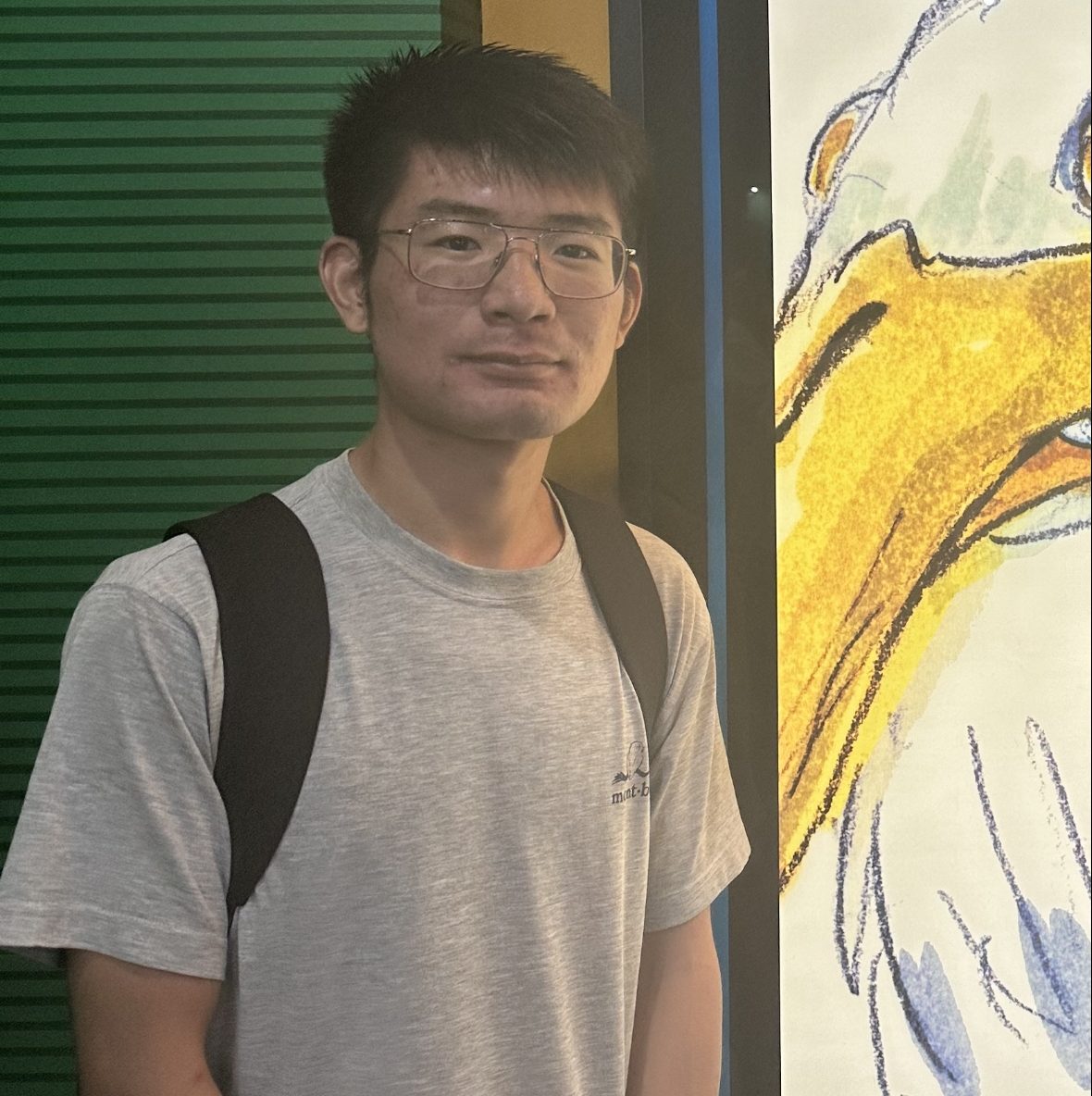
CHANG KuoCh’ing
[Graduate School of Informatics, Kyoto University]
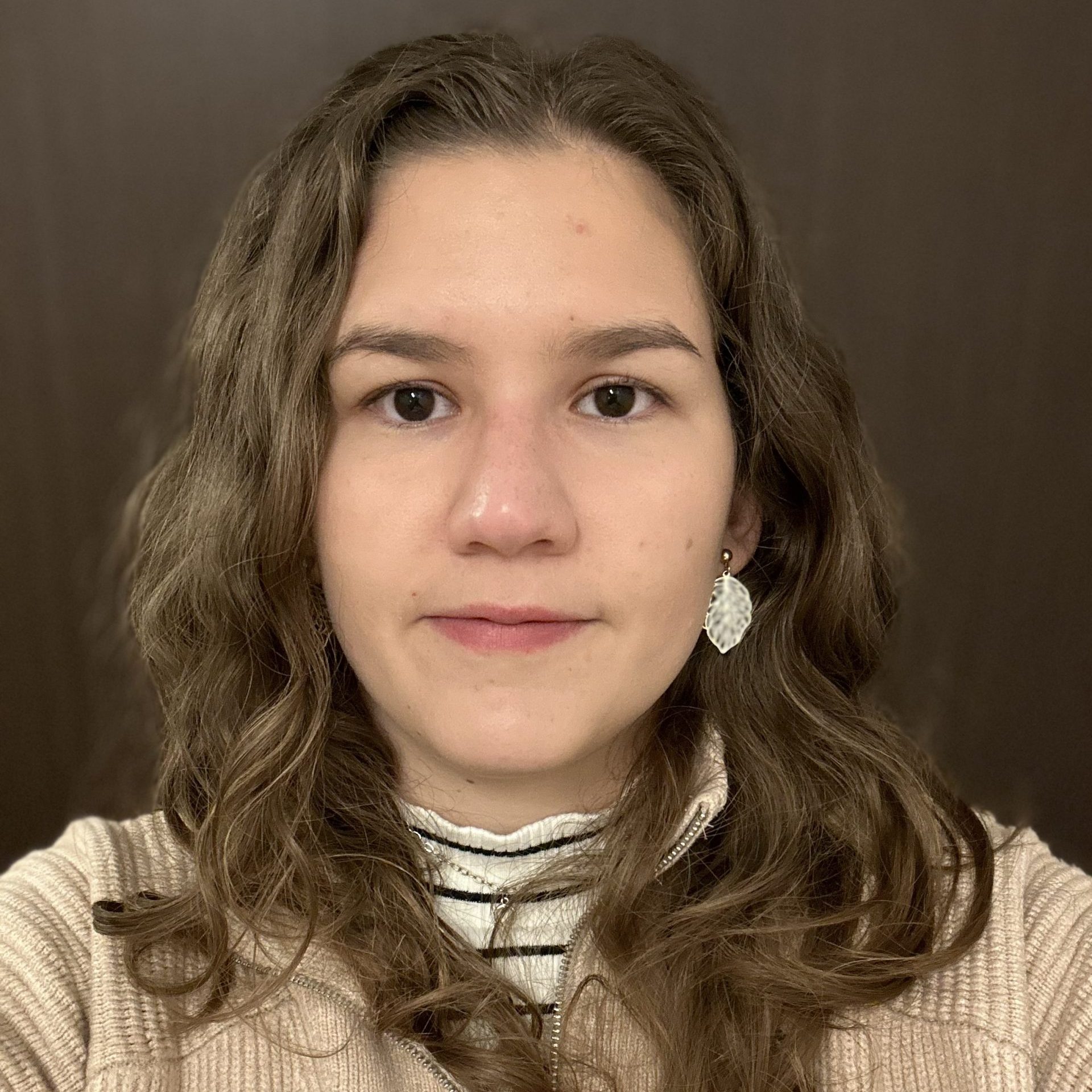
Ana Belén Barrera Aguirre
[Center for the Evolutionary Origins of Human Behavior, Kyoto University]
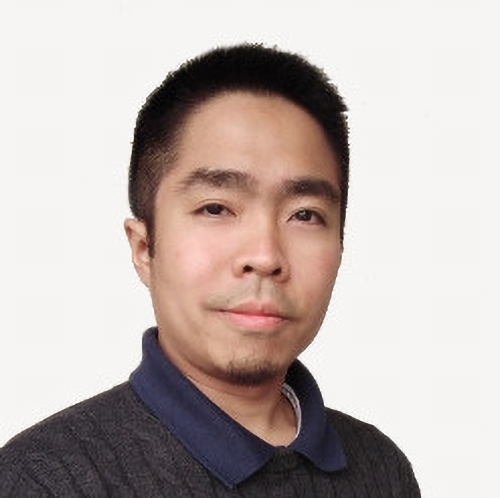
Samuel Matthew Girao Dumlao
[Graduate School of Energy Science, Kyoto University]
Contact
Office of the Program for the Development of Next-generation Leading Scientists with Global Insight (L-INSIGHT), Kyoto University
Phone: 075-753-5916
Email: admin-l-insight@mail2.adm.kyoto-u.ac.jp
Organizers
Kyoto University Center for Enhancing Next-Generation Research
Kyoto University Division of Graduate Studies


Collaborators
The Hakubi Project、Kyoto University Research Administration Center、Kyoto University European Center
